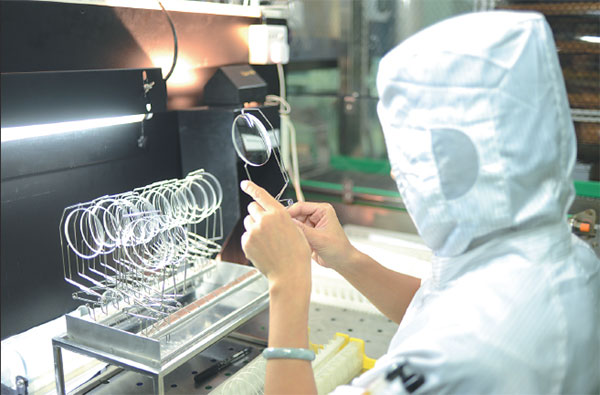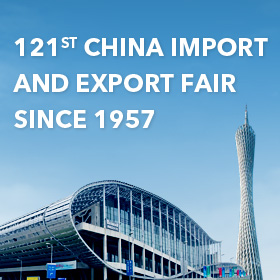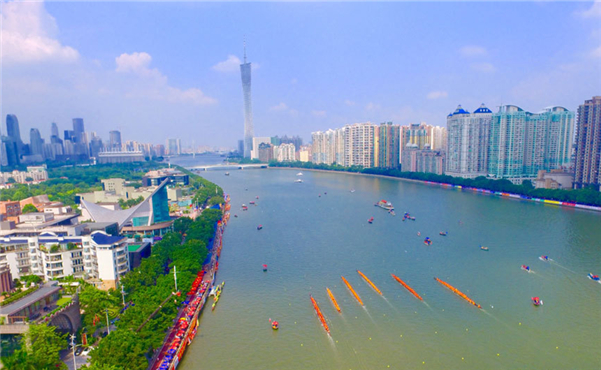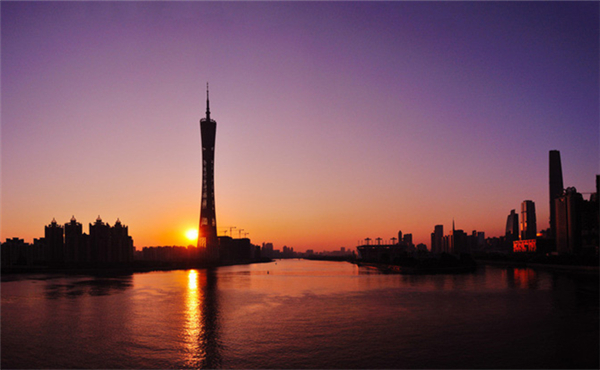Europe eyeing opportunities in tech hub
Foreign-funded enterprises enjoy high rewards in expanding megacity that is focused on innovation, industrial upgrading
Germany-headquartered optical and optoelectronic giant Zeiss emphasizes industrial upgrading and technological innovation, a focus it has in common with Guangzhou, capital of Guangdong province, said a senior executive of its Chinese operations.
"The German government is advancing its Industry 4.0 campaign, which stresses the development of intelligent manufacturing in factories," said Peng Wei, managing director of the Vision Care Business Group at Zeiss (China). "We have brought the concept over here to improve our operational efficiency."
Guangzhou aims to become a national innovative city and international technological innovation hub by 2020, according to the city's development plan.

A technician checks glasses at Zeiss (China)'s Vision Care Business Group in Guangzhou. Optical and optoelectronic giant Zeiss is headquartered in Germany and has invested in the city for more than two decades. [Photo Provided to China Daily]
According to the Guangzhou commission of commerce, the city plans to establish an industrial fund of up to 5 billion yuan ($735 million, 652 million euros) for the commercialization of research findings. It also expects to draw about 20 billion yuan in nongovernmental investment for the industrialization of scientific results.
Peng said Guangzhou's location and investment environment are drawing investors.
"At the same time, the city boasts an investment-friendly environment and favorable policies, which have benefited the Vision Care Business Group over the past two decades since its China headquarters were founded in Guangzhou in 1995," he noted.
Business-focused incentives include a three-year government award granted to new companies founded at the Guangzhou Development District this year and involved in advanced manufacturing, modern services, the headquarters economy and high-tech industries. This aims to recognize and encourage their contribution to the local economy, according to a policy released in February to spur local industries.
"The policy is attractive for both enterprises and individuals," Peng said. "It helps to create an environment where companies can put all their energy into cultivating professionals and innovation to promote industrial upgrading and sustainable development."
Statistics from the Guangzhou commission of commerce show the city's trade with Europe reached 130.82 billion yuan last year, increasing 8.1 percent from a year earlier, including 77.25 billion yuan in exports.
Companies from Guangdong invested a total of $380 million in establishing businesses in Europe in 2016, 3.9 times the investments in 2015.
In comparison, European investors had founded 969 companies by March, involving $3.42 billion of foreign capital, $2.8 billion of it currently in place.
Cai Chaolin, deputy mayor of Guangzhou, said the city remained the only foreign trading port that has never closed and has remained prosperous in China over the past 2,000 years.
Now it has more than 16 million citizens and a GDP equaling that of Hong Kong and Singapore, he said.
Guangzhou Port's cargo handling capacity reached 544 million metric tons last year, ranking No 6 in the world. Baiyun International Airport welcomed 59.78 million passengers in 2016, ranking No 3 in China.
As the largest port city in the Pearl River Delta by annual cargo throughput, Guangzhou is key to linking Hong Kong with the mainland.
The city is also exploring new mechanisms in line with common international practices to facilitate trade and investment. Evolving from its Nansha pilot free trade zone, more than 200 innovative achievements and 85 practices have been promoted in Guangzhou and nationwide, local officials said.
The Nansha free trade zone is part of China (Guangdong) Pilot Free Trade Zone founded at the end of 2014, which also covers Zhuhai's Hengqin and Shenzhen's Qianhai and Shekou.
Alan Murray, president of Fortune magazine, said at the Davos Switzerland event held in January that Guangzhou has become the fifth Chinese city to host the 2017 Fortune Global Forum, from Dec 6 to 8.
With the theme of "Openness and innovation: Shaping the global economy", the upcoming meeting is designed to provide cooperation opportunities for representatives of the business community from around the world.
Promotion of the forum will be held in 12 cities around the world, including Munich in Germany on June 12 and London in the United Kingdom on June 14. Murray, officials from Guangzhou and host countries, representatives of Fortune Global 500 companies and major Guangzhou businesses will attend the event.
Peng said: "Guangzhou is an open, inclusive and pragmatic city. It is always at the forefront of China's reform and opening-up. Government departments feel a sense of service toward local residents, as do companies toward citizens."
(China Daily European Weekly 06/09/2017 page28)

 Print
Print Mail
Mail 121st China Import and Export Fair
121st China Import and Export Fair Lychee culture festival revs up in Guangzhou
Lychee culture festival revs up in Guangzhou Dragon boat race highlights from Guangzhou
Dragon boat race highlights from Guangzhou Guangzhou soup
Guangzhou soup Intl dancers cha-cha in Guangzhou
Intl dancers cha-cha in Guangzhou Canton tower
Canton tower